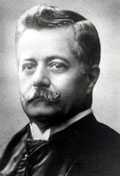Losing his parents in an outbreak of smallpox (1873), Epitácio Lindolfo da Silva Pessoa was educated at a state-sponsored school and was aided by his uncle Henrique Pereira de Lucena (Barão de Lucena), President of the Province of Pernambuco in 1872-1875 and 1890. Pessoa graduated with honors from the Faculty of Law in Recife (1886) and served as public prosecutor at Bom Jardim and the District of Cabo in Pernambuco (1887-1889). After the proclamation of the Republic (15 Nov 1889), Pessoa accepted the nomination as secretary in the state government of Paraíba (1889-1890) and was elected to the National Constituent Congress (1890-1891). As a staunch opponent of Floriano Peixoto, Pessoa refused to stand for re-election to the Chamber of Deputies. He was appointed minister for justice and internal affairs (15 Nov 1898 - 6 Aug 1901) in the cabinet of Manuel de Campos Sales and worked on drafting a civil code. Appointed a minister of the Supreme Federal Tribunal (25 Jan 1902 - 17 Aug 1912), Pessoa also held the office of Prosecutor of the Republic (7 Jun 1902 - 21 Oct 1905). He retired from the tribunal and returned to Paraíba, where he was again elected senator (1912-1916). While Pessoa was representing Brazil as a delegate at the Paris Peace Conference (1919), he was elected President of the Republic (13 Apr 1919) with the support of the Mineiro Republican Party (Partido Republicano Mineiro). Elected to complete the term of Francisco de Paula Rodrigues Alves, who died before taking office, Pessoa was sworn in upon his return on 28 Jul 1919. A post-war crisis in the world market of coffee affected the Brazilian economy resulting in an almost 50% fall of the coffee price. Pessoa, pressed by the coffee planters from São Paulo and Minas Gerais, gave up the policy of state intervention and took measures for defending the coffee market by acquiring foreign loans. The center of opposition was the State of Rio Grande do Sul, whose politicians in alliance with those of Bahia, Pernambuco and Rio de Janeiro formed the Republican Reaction bloc (Reação Republicana) in order not to allow the coffee oligarchy to install Artur da Silva Bernardes as the next president. When the bloc failed to win the election of 1 Mar 1922, Pessoa met a new challenge as the military were insulted by the letters ascribed to Bernardes and published in the newspapers. The closure of the Military Club and the arrest of ex-president Hermes Rodrigues da Fonseca eventually led to the revolt in the Copacabana Fort (2 Jul 1922), which marked the beginning of the tenente movement. After leaving the presidency on 15 Nov 1922, Pessoa succeeded Rui Barbosa as a member of the Permanent Court of International Justice (1923-1930). Pessoa supported Getúlio Dorneles Vargas in the presidential campaign of 1930 and resigned his position in The Hague after the news of the murder of his nephew, João Pessoa Cavalcânti de Albuquerque (26 Jul 1930), president of the State of Paraíba. Pessoa never recovered from this loss and suffered from Parkinson's disease in the last years of his life. [1] |

